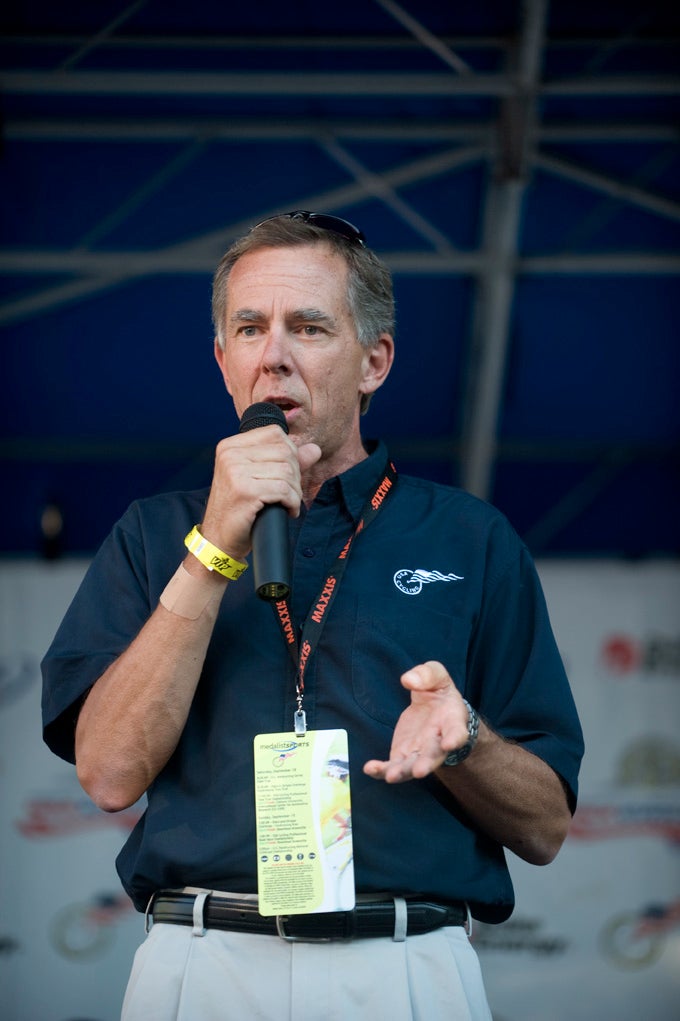Landis suit accuses USA Cycling of doping cover-ups

USA Cycling CEO Steve Johnson is named in Floyd Landis' whistleblower claim. Photo: Casey B. Gibson | <a id="www.cbgphoto.com" href="http://cbgphoto.com">www.cbgphoto.com</a>
BOULDER, Colorado (VN) — Floyd Landis is poised to set American cycling on fire, all without saying a word. USA Cycling and CEO Steve Johnson found themselves fighting off the flames on Thursday.
Landis famously sent letters to top anti-doping officials in the spring of 2010 that outlined systemic doping on the U.S. Postal Service team and contributed to the investigation of Lance Armstrong, a former teammate. A whistleblower suit filed by Landis against Armstrong and a host of the Texan’s friends and advisers in 2010 was leaked Thursday — the day Armstrong is expected to publicly confess to using performance-enhancing drugs in an interview with Oprah Winfrey.
Among the most damning allegations in the whistleblower suit is that USA Cycling worked to cover up doping at the highest levels of American cycling to keep sponsorship dollars from the U.S. Postal Service. USA Cycling president and CEO Steve Johnson, whom the lawsuit noted specifically addressed cover-ups in 2007, flatly denied the allegation in an email to VeloNews on Thursday.
“I saw that allegation in the complaint, and it is as misguided as many other sources that have vaguely intimated that USA Cycling or I participated in some kind of cover-up,” Johnson wrote.
The initial Landis suit, filed on June 10, 2010 in the District of Columbia, indicates a cobweb of finance and power at the upper echelons of cycling in the United States. According to the documents published by New York Daily News on Thursday, USA Cycling officials were at times financially tethered to Tailwind Sports, a corporation linked to Armstrong and his advisers, and U.S. Postal team backer Thomas Weisel’s investment bank, for which Jim Ochowicz, a former USAC president, now works as a director.
Ochowicz did not return a request for comment for this story.
In the late 1990s, the U.S. Cycling Federation oversaw cycling in the United States. Its parent, USA Cycling, found itself short on cash, and Weisel stepped in, reorganizing cycling stateside and establishing a non-profit organization called the USA Cycling Development Foundation, to raise funds for USA Cycling.
Weisel served as its president and chair from 2000-2003 according to IRS forms, and his “old cycling buddy” Johnson served as executive director, according to the Landis suit. The filing also states Weisel’s development foundation paid out $500,000 to $725,000 a year, what amounted to a “substantial” amount of USA Cycling’s budget. Johnson was the COO of USA Cycling at the time.
In Landis’ whistleblower suit, he alleges those conflicts of interest led to cover-ups of the highest order, and that “they helped make it possible for the USPS Team to carry on the extensive program of systematically doping team athletes.”
Specifically, the legal papers allege that Johnson was asked about cover-ups involving doping in 2007 in New York City, and said they were used because “we can’t lose sponsors like the Postal Service we have no choice.” The suit alleges Johnson spoke that phrase to Mark Holowesko, a backer of the national development program and an adviser to Slipstream Sports.
The Venn diagram of American cycling’s purse strings and leadership have long raised suspicions, but the leaked lawsuit is a flash-bang in the American cycling establishment arena.
There seems to be a disagreement over the facts, however. On Thursday, Johnson disputed Landis’ claims.
“The alleged statement attributed to Mr. Holowesko by Mr. Landis is puzzling … In short, I made no such statement; in fact, by the time I first met Mr. Holowesko, USPS was no longer involved in the sport,” Johnson wrote to VeloNews. “We have released a statement that addresses the common — but grossly inaccurate — assumption that USA Cycling has anything whatsoever to do with doping or is in a position to affect (much less cover up) doping violations.”
Johnson also defended the links to Weisel, the banker whose name managed to stay out of Armstrong’s doping glare until just days ago.
“Thomas Weisel has been one of many USACDF donors whose accumulated support in the range of $18 million in the last decade has been a key both to the tremendous growth of cycling as a popular recreational activity and to the reemergence of the United States as an international cycling power. Substantial information regarding the finances of USA Cycling and the USACDF has always been available to the public,” Johnson wrote.
Also of note are two elements on the 2010 filing: Landis essentially filed the document on behalf of the United States of America — similar to a citizen’s arrest — but without the federal government’s backing. Thursday was the initial deadline for federal prosecutors to join the whistleblower suit, and it’s unclear if the government elected to do so. Also, the suit notes “does 1 – 50” as defendants, meaning many more names, and perhaps many more investors, could be on the hook.